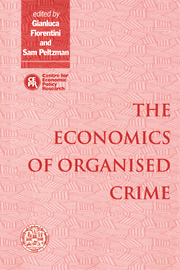Book contents
- Frontmatter
- Contents
- List of figures
- List of tables
- Foreword
- Acknowledgements
- List of conference participants
- 1 Introduction
- PART I THEORIES OF THE STATE AND THE ORIGIN OF CRIMINAL ORGANISATIONS
- 2 Organised crime, mafia and governments
- Discussion
- 3 Gangs as primitive states
- Discussion
- PART II THE CRIMINAL ORGANISATION AS A FIRM
- PART III ORGANISED CRIME AND STATE INTERVENTION IN THE ECONOMY
- PART IV DETERRENCE POLICIES AGAINST LEGAL FIRMS INVOLVED IN ILLEGAL ACTIVITIES
- PART V DETERRENCE POLICIES AGAINST ORGANISED CRIME
- Index
Discussion
Published online by Cambridge University Press: 04 August 2010
- Frontmatter
- Contents
- List of figures
- List of tables
- Foreword
- Acknowledgements
- List of conference participants
- 1 Introduction
- PART I THEORIES OF THE STATE AND THE ORIGIN OF CRIMINAL ORGANISATIONS
- 2 Organised crime, mafia and governments
- Discussion
- 3 Gangs as primitive states
- Discussion
- PART II THE CRIMINAL ORGANISATION AS A FIRM
- PART III ORGANISED CRIME AND STATE INTERVENTION IN THE ECONOMY
- PART IV DETERRENCE POLICIES AGAINST LEGAL FIRMS INVOLVED IN ILLEGAL ACTIVITIES
- PART V DETERRENCE POLICIES AGAINST ORGANISED CRIME
- Index
Summary
The very stimulating paper by Skaperdas and Syropoulos (henceforth S&S) accomplishes many things. It extends the formal analysis of the economics of crime yet another step and shows once again how powerful and suggestive the economist's tools have become, even outside the discipline's traditional realm. The article shows, in particular, that it is useful in an analysis of one side of their operations to think of criminal organisations as quasi-governments, serving in lieu of the state in arenas into which governments fear to tread, and in other areas forcing government by the state to let itself be replaced by the gang in some of the tasks of governance. Finally, the paper stimulates the reader to venture into new directions, as these few comments will illustrate.
The basic point of the article is obviously valid, and obvious only in retrospect. The distinguishing feature of crime that is organised is, of course, the fact that it is controlled and directed by a group whose role is far more than just administrative. In particular, it determines the rules that the gang members will be expected to follow, and it adopts procedures designed to enforce those rules. Thus, the gang leadership takes on legislative and judicial tasks, in addition to its administrative activities and, by virtue of these undertakings, it becomes a government. One can easily see what other governmental roles it plays, entailing such activities as warfare, diplomacy, the provision of employment and welfare benefits to its members, etc. In places where ‘legitimate government’ abdicates its role, or is simply prevented by circumstances from performing it, organised gangs frequently spring up and fill the gap.
- Type
- Chapter
- Information
- The Economics of Organised Crime , pp. 82 - 84Publisher: Cambridge University PressPrint publication year: 1996



